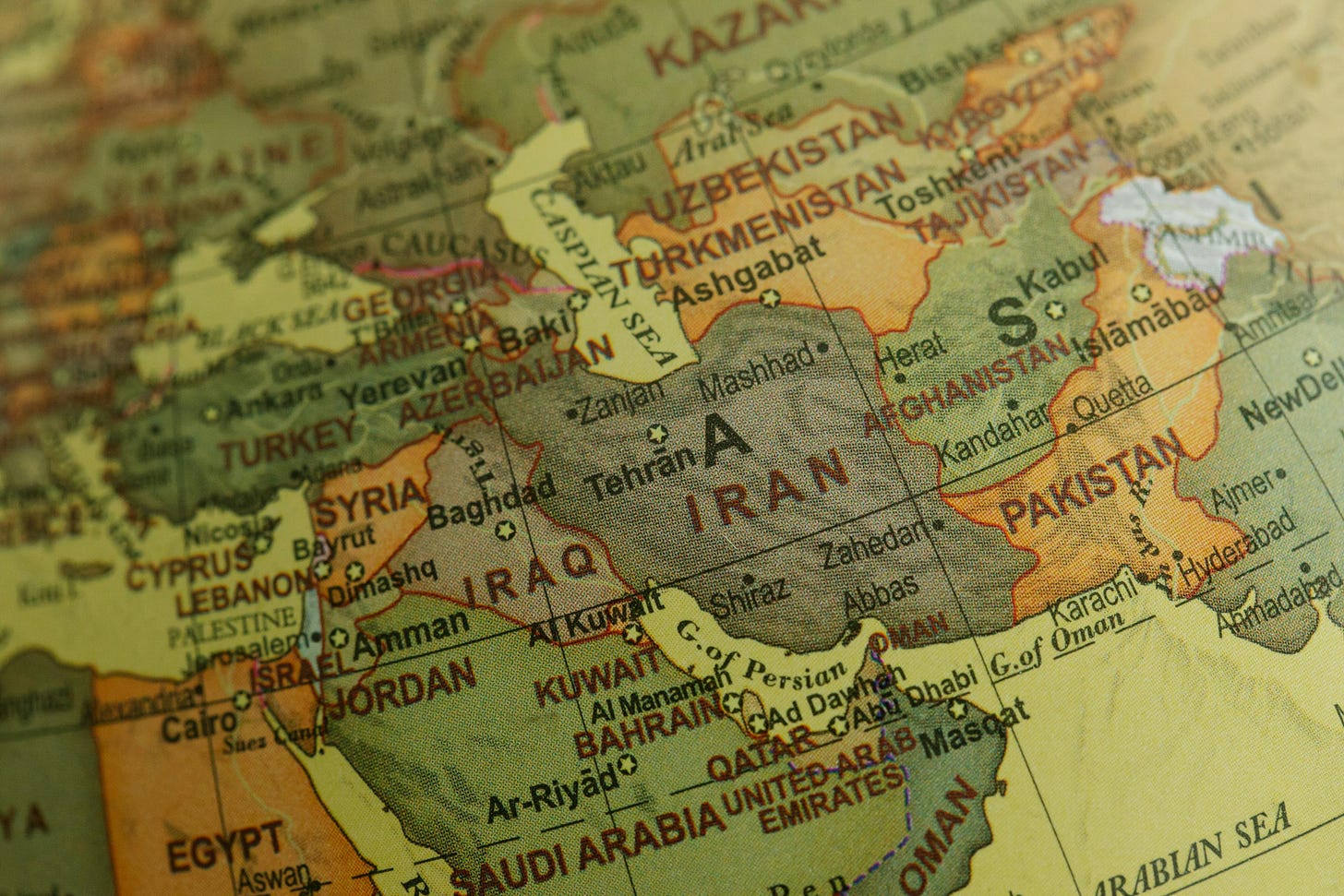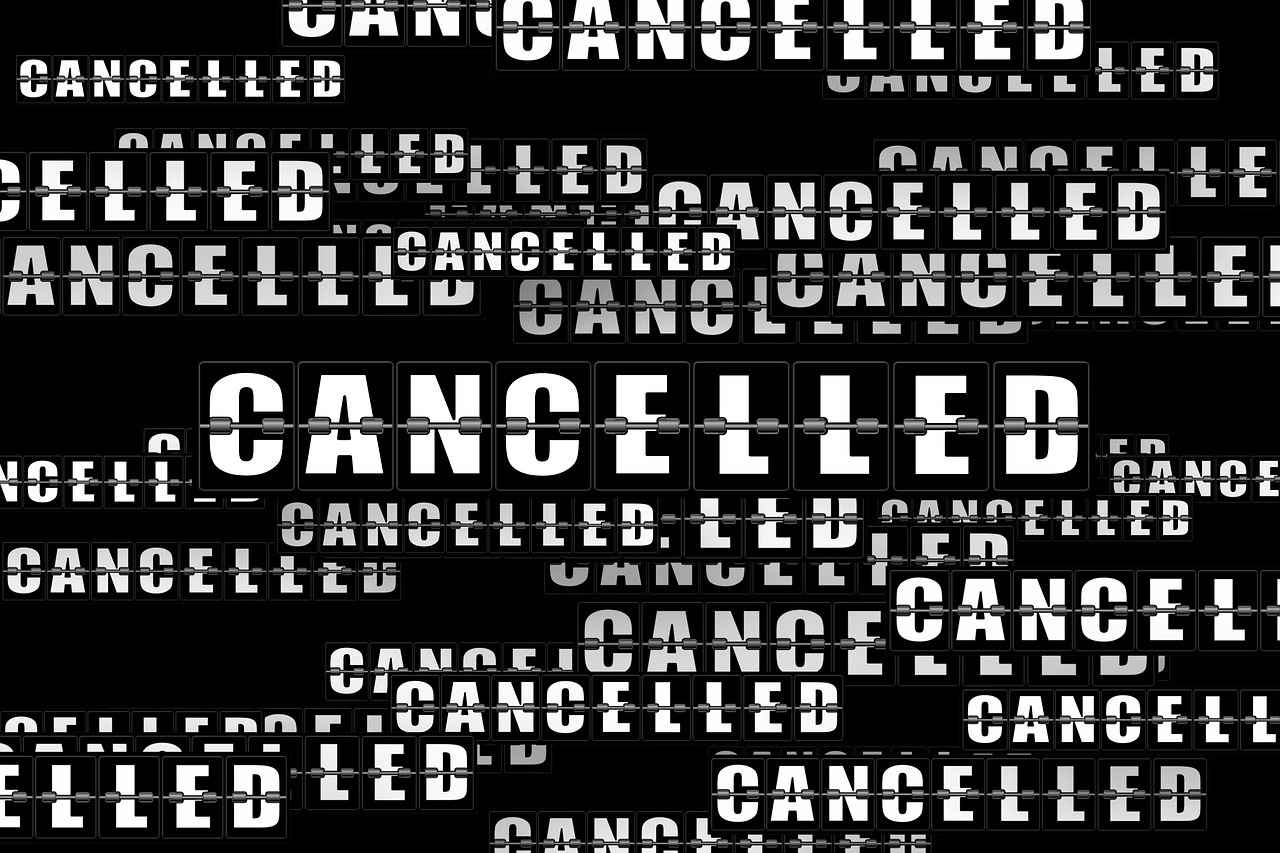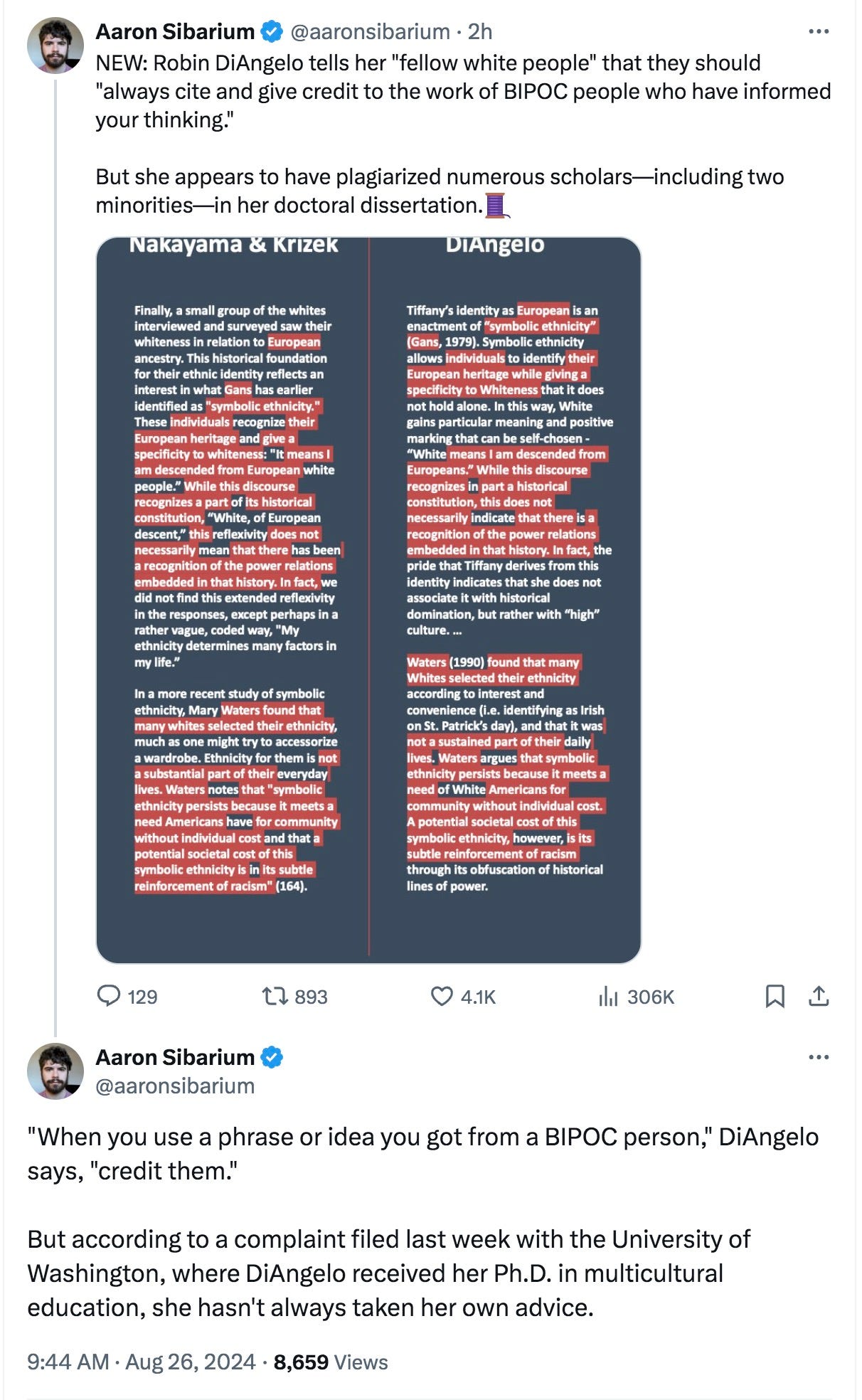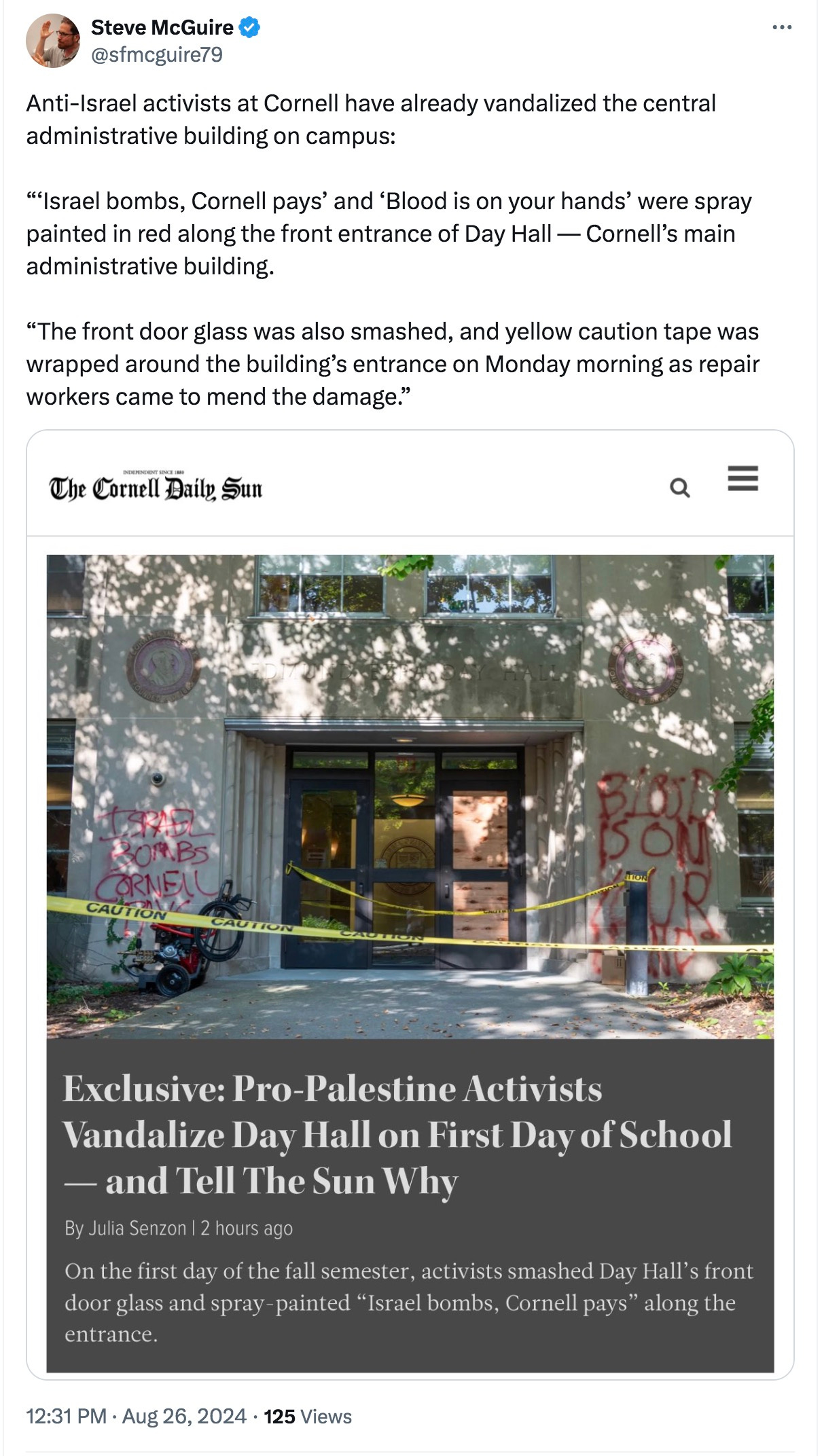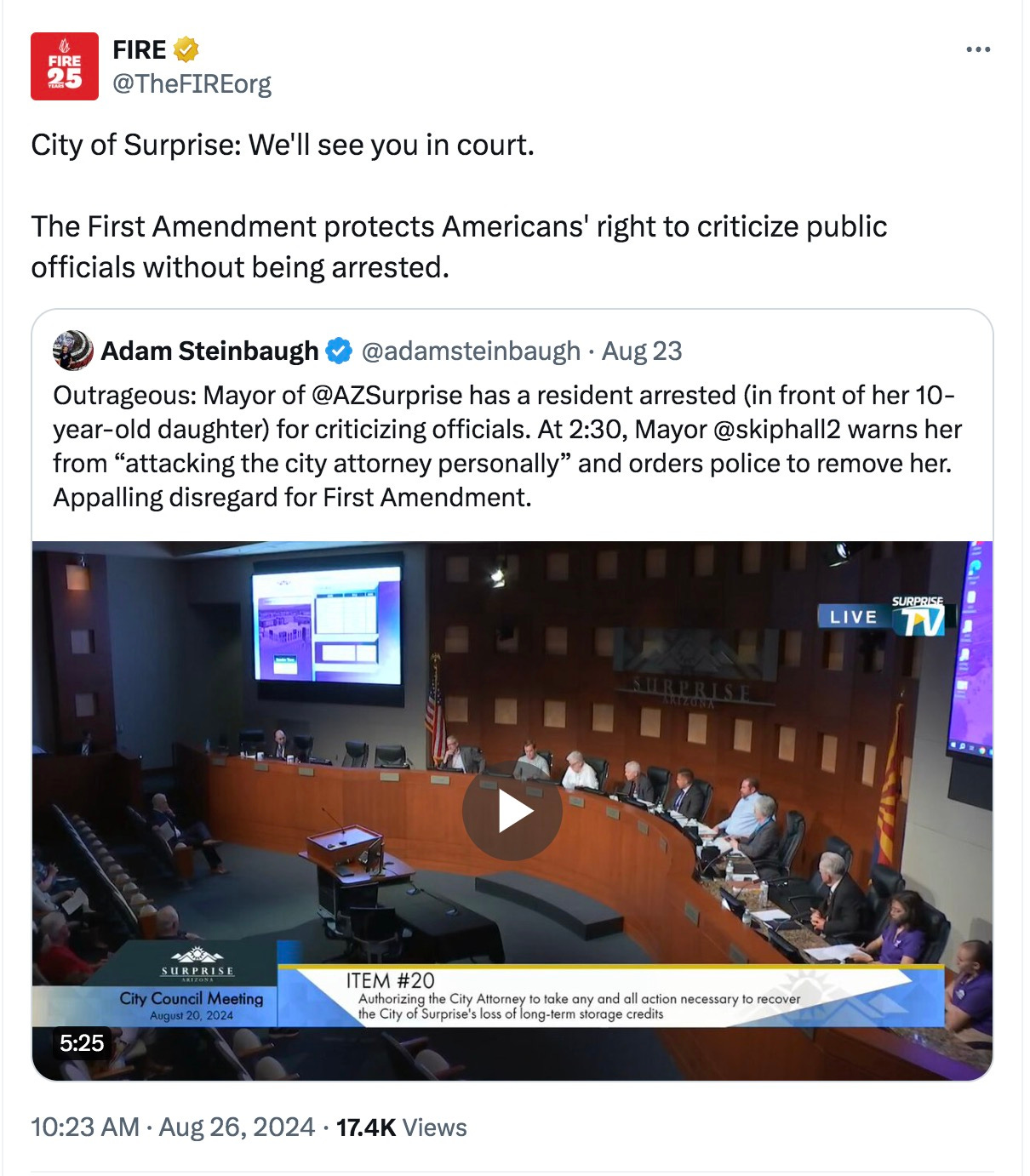E-Pluribus | August 26, 2024
The cancellation's the thing; how journalists get the Middle East wrong; and when the 'morning after never comes.
A round-up of the latest and best musings on the rise of illiberalism in the public discourse:
Rosie Kay: The Cancellation Playbook
Writing for the Foundation Against Intolerance & Racism, Rosie Kay spells out how cancellation works in the arts and what needs to happen to reverse the current trend. Kay argues that artistic and political cancellations are connected. If “politics is downstream from culture,” then “culture is itself downstream from the arts,” she concludes.
The history of banned and censored work is long and illustrious. Oedipus Rex by Sophocles, Salome by Oscar Wilde, and The Crucible by Arthur Miller were all banned either at their conception or thereafter as tastes and moral mores shifted. In the UK, it has been only 56 years since the Theatre Act of 1968 abolished the state censorship of the British stage. Modern bannings and cancellations of high-profile works have tended to be quite major art news scandals.
One of the important realities of this new cancellation culture is that it has largely evolved away from state sanctions. Since around 2020, we have seen a very different kind of ostracization play out: the canceling of artists due to their own privately held beliefs. Often, the cancellation comes from fellow artists, leading to the epidemic of self-censorship we see in the arts today.
[. . .]
Having worked with over 30 artists who have been attacked, cancelled, or quietly ghosted by those inside their own profession, I have noticed that there is a playbook for cancellation. It goes as follows: The Scene-Setting, The Incident, The Investigative Process, The Toll, and then The Conclusion. By analyzing the playbook, it is easier for artists to realize that a formula is being carefully executed against them. They are not alone, nor are they going mad.
The Scene-Setting involves creating a weighty awareness of which thoughts are acceptable in their workplace, and which are not – through ‘training’ sessions (or rather ‘struggle sessions’), forced consultations with activist groups, and changes to organizational policies. The ground is laid to define what is ‘right’ and ‘wrong,’ which virtue signallers and bullies love to take advantage of.
[. . .]
Then comes The Incident. In our experience supporting artists undergoing cancellation, many are attacked for simply expressing legal and moderate views, or for asking questions. One artist we know was attacked for responding to feedback asked by management around a new Equity policy.
[. . .]
The Investigative Process then becomes the punishment. Artists are often forced to write the ‘hostage apology’, which we’ve seen time and time again does not placate the mob. It is an admission that the bullies were right; they will never accept it, and they tend to demand more and more.
[. . .]
The Toll is that an artist’s very sense of self is destroyed. Their reputations, which took a lifetime to build, are under threat within a moment, their future completely uncertain. We have seen the suicides of artists while others have spoken out publicly about this threat to their sanity and life. This is so serious that it is a matter of life and death for committed artists.
[. . .]
The Conclusion is bittersweet. The loss of livelihood and financial security experienced by canceled artists (including me) is utterly real. We are slowly finding new networks, new venues, and new collaborations. But how do we reach our audiences? The gatekeepers are currently very risk-averse or partially captured themselves. There has been little leadership on these issues from senior people in the arts, and certainly nothing coordinated at scale—yet. At both FAIR in the Arts and Freedom in the Arts, we are leading by advocating for clear guiding principles, hoping to influence artists, arts institutions, and policymakers all across the world.
Read it all.
Nils A. Haug: The Middle East: A Story of Journalistic Failure
Why does so much news coverage of the Middle East seem slanted against Israel? It could partly be that the media often see itself as fighting for the little guy against the powerful, and Israel is seen as the major power in the region. But, writes Nils Haug of the Gatestone Institute, a larger problem might just be a lack of historical knowledge. Unless reporters and journalists take the time to learn about the past, their present and future reporting will continue to be based more on feelings than facts.
On May 15, 1948, five Arabs armies started a war – and lost. From that time on, many Arabs have called this loss a "nakba" ("catastrophe"). Ever since then, they have been seeking sympathy for losing a war which they began. If they are unhappy, perhaps they should not have started a war in the first place.
On that May 15, forces from Egypt, Syria, Transjordan, Lebanon, and Iraq "swooped in... just hours after British forces withdrew from Palestine and Israel had declared its independence." Until then, anyone born there was a Palestinian. Christians were Palestinians, Jews were Palestinians. The "place of birth" on every passport was stamped "Palestine."
Arabs who fled during the fighting had likely assumed, based on broadcasts they were hearing, that leaving the area would make it easier for the Arab armies to kill the Jews. The plan presumably was to return soon to collect the spoils and take possession of a swiftly-conquered land.
When the Arab armies were defeated, and some of the people who had fled tried to return, they were told they had not been loyal and were refused admittance. It is the Arabs who fled, and their descendants, who now call themselves Palestinians. They are simply Arabs who fled Israel at the time and were not allowed back.
[. . .]
The Arabs who did not leave Israel during the War of Independence, and their descendants, still live there as Israeli Arabs, full citizens with the same rights as Jews, except exempt from military service -- Israel did not want anyone fighting his brother. These Israeli Arabs now make up 20% of Israel's population and hold prominent positions in medicine, business, journalism, the judiciary, representation in Israel's parliament, and even on Israel's Supreme Court. The claim of "apartheid" is a libel. By contrast, Arabs who had fled to Lebanon in 1948 are still prohibited from holding any number of worthwhile jobs. Some Arabs call that the real apartheid.
Israel, during that war and in the years after, welcomed roughly the same number of Jewish refugees who were expelled or fled from Arab states as there were Arabs who fled from Israel -- roughly 700,000 for each side. Unlike the Jews, however, the Arab countries refused to let their Arab "brothers" in as full citizens, and demanded that they could only "return" to the country they had just willingly left. Since that time, many Arab countries and enemies of Israel have used these souls and their descendants as political pawns to protest that Israel refused to let them in after they had started a war to exterminate it.
In 1967, the Arabs started another war -- and lost. Israel, after warning Jordan not to enter it -- a warning Jordan ignored -- retook land, including parts of Jerusalem, which Jordan had captured in the unlawful, earlier war. Israel also re-entered its historical homeland, Judea and Samaria, on the west bank of the Jordan River, which separates the two countries. This was when the calls began claiming that Jerusalem and the West Bank were supposedly "occupied". They had indeed been "occupied" -– illegally, by Jordan since the war of 1948. What is never said, of course, as at least one of the names denotes, is that the supposed "occupiers," the Jews, have historically been "occupying" this land for nearly 4,000 years.
Nevertheless, calls for Israel to end its supposed "occupation" began to emanate not only from Islamist media but even from supposed journalists in the West. Sadly, these allegations are never based on history or facts, but appear to come from ideological myths generated by theories of social justice and real or imagined victimhood.
[. . .]
How these one-sided articles, proposals, and beliefs come about, apart from blatant anti-Semitism and anti-Zionism, might be worth looking into.
Some blame can be attributed towards a failure to apply the basic principles of journalism: namely, investigating the facts and then seeing where they lead. In today's kinetic news train, journalists often do not have the time, or possibly think they do not have to bother with, investigating the real story -- the history and facts -- behind popularised assumptions. They might also be told by their editors, explicitly or implicitly, what stories to bring and what not to bring. Veteran journalist Mark Judge laments that in the past, "writers found stories by exploring their subjects, and filled their reviews with insights and wisdom that came from long years of experience."
Perhaps some journalists – on both sides of the political spectrum – now write to pacify their editors, publishers or advertisers, whether consciously or not. The eminent editor of the New York Times Editorial Page, James Bennet, was fired for having published a column by Senator Tom Cotton that ran counter to the prevailing fad of the month. Cotton had suggested that if the riots at the time persisted, the government might "Send in the Troops" -- evidently a heresy; better to let the city burn down.
At crucial times in a polarized society, such as the present, independently-minded writers -- those with a critical outlook, integrity, and an objective, unbiased, attitude essential for the common good of their audience -- appear to be an endangered species.
"Independent journalism" wrote Bennet, is seen in "fair-minded, truth-seeking journalism that aspires to be open and objective." The New York Times' problem, he added, had "metastasised from a liberal bias to an illiberal bias; from an inclination to favour one side of the national debate to an impulse to shut debate down altogether."
The lacking element, Bennet claimed, is that of courage -- courage to write truth and to disclose the real facts in the face of editorial pressure to capitulate to fashionable ideals, increase sales, comply with the prevailing office ethos or to follow conventional wisdom -- all of which may mask truth. He noted integrity as the "moral and intellectual courage to take the other side seriously and to report truths and ideas that your own side demonises for fear they will harm its cause." That is the crux of the matter: a possible harming of the "cause" -- an ideological position, and anathema to objective reporting.
Read the whole thing.
George M. Perry: No ‘Morning After’ for Victims of Cancellation
At Reality’s Last Stand, George Perry is less optimistic about coming back from cancellation than Rosie Kay in item #1 above. Perry says in his experience, the trauma and consequences of cancellation (some high-profile exceptions aside) are devastating and long-lasting.
Nellie Bowles concludes her memoir, Morning After the Revolution: Dispatches from the Wrong Side of History, by recounting an interaction with a former friend whom Bowles had targeted during her “revolution” phase. In the final chapter, titled “The Joy of Cancellation,” Bowles admits to reveling in the act of cancelling this individual. However, she later writes, “[t]here came a day when I didn’t cancel someone,” which prompted the ex-friend to confront her. “I knew what was coming when I saw her name on my phone... ‘Nellie, you say a lot of things, but you haven’t said anything about this one today.’ She very politely told me that I was a racist, then she said goodbye.”
Bowles closes her book with a reflection: “I never heard from my friend again after she said goodbye. I get it. She’s drawing the line. Part of me admires her for it.”
[. . .]
Bowles admires what she perceives as her ex-friend’s resolve in “drawing the line,” in contrast to her own self-described “hemming and hawing” moderate ways. Bowles “agonized... sweating in my apartment” over her pivotal decision to forego that last cancellation. She explains, “I sometimes get this bizarre psychosomatic stress response where my arms go limp in a panic. And all that day my arms were going limp.”
Magnify that experience to reach a more plausible explanation for her ex-friend’s silence. For that cancelled person, every mention of “Nellie Bowles” in articles, social media posts, podcasts, and on the big stack of yellow and red covers at bookstores might trigger trauma. Merely dialing Bowles’ number—without even pressing the “call” icon, let alone someday actually facing her—could represent a significant milestone in the ex-friend’s psychological therapy.
“Neal” recently learned that an ad hoc consortium, including his former employer, is opening a new inquiry into the accusations that precipitated his cancellation. “Cue sleepless nights, depression, spontaneous crying jags, fear, rumination, bad shits, twitchiness, fighting the desire to just get hammered, wondering who is saying what behind my back,” he wrote to me. Several months earlier, he said, “still to this day, I carry baggage about just turning on my computer and getting an email. I’m scared shitless of media and that public stuff. I would get registered letters in the mail from [the national newspaper that published the cancellation], because that way they could say, ‘We did reach out to you.’”
[. . .]
Humiliation is a deeply social and interactive experience. Its intensity escalates with the number of participants and witnesses. Public cancellations represent the pinnacle of humiliation—how could something be more social, more interactive, with an essentially unbounded number of witnesses? The severity of a cancellation’s trauma—the “dose” in the relationship sketched above—is a function of clicks, views, and impressions.
These metrics are always increasing. The internet is, as we all know, forever. Those headlines and articles never go away.
Dr. Christine Marie, a media psychologist and consultant who specializes in media humiliation and misrepresentation, is lobbying for the American Psychiatric Association to recognize MHM as a precursor to PTSD in the forthcoming DSM revision. She emphasizes that the enduring presence of digital content is “the essence of the unique trauma of cancellation and media humiliation. When you are canceled, you have a form of trauma that is in the past, in the present and in the future.” That’s true even without explicit revictimization, such as the re-investigation Neal is experiencing.
[. . .]
The article that cancelled Neal centered around a specific, on-the-record accusation. But that accusation became secondary to a narrative about intimidation, disregard for athlete health and well-being, power politics from the level of the locker room up through national federations, and institutional corruption. Subsequent articles and think pieces went increasingly far afield with vague, context-free, and sometimes anonymous or awkwardly first-person denunciations.
Not one verified any claim against Neal. No one else ever made an accusation similar to the original. And Neal has never had so much as an administrative complaint filed against him.
Read it all here.
Around Twitter (X)
The Free Beacon’s Aaron Sibarium is back with yet another plagiarism scandal:
Are anti-Israel protesters going for a repeat of last year? Recent events at Cornell might be an indication:
And finally, no surprise here:





